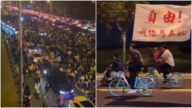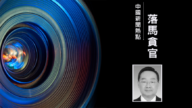【新唐人2011年9月26日讯】近年来,常有人将温家宝比喻成中国的“叶利钦”,最近更有文章说:温家宝在大连谈“以党代政”、“党政分开”,是“温的宣战书”,还说,温“要当中共真正的‘叶利钦’”。学者认为,中国没有出现戈尔巴乔夫,更不可能出现叶利钦。但是温家宝如果带领大家一起退出中共,迈出这一大步后,还是有希望成为中国的叶利钦。
温家宝在大连夏季“达沃斯论坛”开幕式上发表讲话,被“世界经济论坛”主席施瓦布(Klaus Schwab)当面夸赞为“一场重要的政治宣言”,接着,温家宝又再放重炮,大谈政改,批评中共政权“以党干政”,他还重提“党政分开”。中共喉舌《新华社》也全文刊发温家宝相关言论,国内外媒体纷纷评论报导。
随着十八大的临近,中国社会问题持续恶化难解,如此下去,胡温一体都将做历史的罪人。有人把温家宝的讲话解读为,温家宝不愿意在历史上留下骂名,因此他想做中国的“叶利钦”。
对此,《北京之春》杂志主编、政论家胡平认为,叶利钦退出苏共也好,当选俄罗斯总统也好,都是在俄国发生民主转型之后。而现在中国,民主转型还没有开始,还没有看到出现戈尔巴乔夫的可能性。胡平表示,把温家宝比作叶利钦不恰当。
胡平:“当年叶利钦也不是苏联的一号人物,但是,是苏共上层中具有反戈思想的人。无非这种比喻来讲温家宝。因为温家宝在中共上层中不是一号人物,但是其中是有反戈思想的人。其他方面相差其实是相差很大的。”
《新世纪新闻》也认为,温家宝在从政经验、勇于担当等方面和叶利钦有差距,不可能成为中国的叶利钦。
著名政论家伍凡表示,叶利钦反对共产党,他的第一个大动作就是退出共产党,而后号召军队跟着他。伍凡说,温家宝敢做到这一点,才可能像叶利钦。
伍凡:“把他当成叶利钦我不敢认同。叶利钦首先它退党,退出苏联共产党,第一步退出共产党,温家宝还没有。第二:叶利钦的性格是非常激烈的,是行动派,他不是幻想的 ,他采取行动了。”
过去8年,温家宝多次在公开场合谈政改,但每提一次政改,温家宝就受到保守派和左派围攻。如,他肯定“普世价值”,“倒温派”的社科院院长陈奎元等就撰文反击;吴邦国、贾庆林也公开否定“普世价值”,还说“三权分立”不符合国情;不少左派文人不点名指责温家宝的改革,将导致亡党亡国。
政论家伍凡表示,“说真话”在共产党很难生存。温家宝如果能号召共产党员和他一起走,退出共产党才真正了不起。
伍凡:“共产党非常复杂,非常非常复杂,你要能拉一批共产党跟你走,才有可能。如果仅仅他一个人,那无所事事,做不成任何事情。”
“中国研究中心”墨儒思(Russell Leigh Moses)教授在美国《华尔街日报》发表“温家宝的话还有人听吗?”(When Wen Speaks, Who is Listening? )文章,他认为,这次温总理坦率的发言和语调,“已经有了大势已去的味道”。
新唐人记者刘惠、宋风、周天采访报导。
Is Wen “China’s Boris Yeltsin”?
Recently, some people called Wen Jiabao metaphorically
“China’s Boris Yeltsin.”
Articles said, Wen talks about separating administration
from party and that this is “Wen’s declaration of war.”
“Wen wants to become a real ‘Yeltsin’ of the CCP
(Chinese Communist Party),” stated some publications.
Scholars believe, since no Gorbachev appears in China,
it is impossible to have Yeltsin too.
However, if Wen were to lead Chinese people to quit CCP,
a big step for him, he can still become China’s Yeltsin.
The speech Wen Jiabao made in the opening ceremony
at the Davos Forum held in Dalian, China, was praised
by chairman of the World Economic Forum, Klaus Schwab,
as “an important political declaration.”
Wen Jiabao came alive again with heavy wording
for political reform. He criticized the CCP authorities
for “the party interference with administration” and
advocated again for “separating CCP from administration.”
The CCP’s mouthpiece Xinhua News Agency
published Wen’s speech in full length,
which was reported and commented
by many media, both home and abroad.
As the 18th CCP congressional meetings draw near,
the social problems in China continue to rise.
If the current situation persists, Hu Jintao and Wen Jiabao
will be condemned by history.
Some saw in Wen’ speech him not wanting to be condemned
by history, but wanting to become China’s “Yeltsin.”
Hu Ping, Editor-in-Chief of Beijing Spring magazine
and political commentator,
said that Yeltsin quit the communist party after the USSR’s
democratic transition and was elected as a President.
However, China has not begun its democratic transition yet,
and the possibility of somebody like Gorbachev
coming into being in China is still narrow. Hu Ping says,
it is thus irrelevant to compare Wen Jiabao to Yeltsin.
Hu Ping: “Yeltsin was not the No. 1 figure in former USSR,
but he cherished the rebellious thought.
This is probably the only ground the metaphor is based on.
Because Wen Jiabao is not a No. 1 figure in the CCP,
but he is a person of rebellious thought. In other areas
however, the differences are actually quite a lot.”
The New Century News also believes that Wen Jiabao
is inferior to Yeltsin in many aspects,
such as administrative experience and courage for action.
Thus it seems impossible for Wen to become China’s Yeltsin.
Renowned political commentator Wu Fan said, the most
significant action of Yeltsin to oppose the communist party,
was to quit it and encourage the military to follow suit.
Wu Fan thinks if Wen can do the same, he can be like Yeltsin.
Wu Fan: “I do not quite concur with the Yeltsin’s comparison.
Yeltsin quit the party first, but Wen has not done so yet.
Also, Yeltsin had a passionate personality. He was a man
of actions, not of illusions, he took real actions (unlike Wen).”
Over the past 8 years, Wen Jiabao has talked repeatedly
about political reform in various public occasions.
However, every time he talked about political reform,
he was jointly attacked by the conservatives and leftists.
For example, when he affirmed the “universal values”
of democracy, freedom and human rights,
the anti-Wen president of Chinese Academy of Social Sciences,
Chen Quiyuan, wrote a rebuttal article to strike back.
Wu Bangguo and Jia Qinglin also openly denounced
the “universal values,”
adding that separation of power is inappropriate
for the situation in China.
A number of leftist scholars indirectly accused Wen’s reform
of leading CCP and communist China towards a demise.
Political commentator Wu Fan says that it is difficult
for a person to talk truthfully and survive in the CCP.
If Wen Jiabao can motivate the CCP members to follow him
and quit the CCP, he will be truly outstanding.
Wu Fan: “It is very complicated inside the CCP.
You have to get a group of CCP members to follow you.
Then it is possible for you to achieve something.
If he acts unilaterally, nothing can be accomplished in reality.”
In a WSJ article titled “When Wen Speaks, Who is Listening?”
the Professor at Beijing Center for Chinese Studies,
Russell Leigh Moses wrote: “Indeed, the directness and tone
of Wen’s comments this time around smack of despondency.”
NTD reporters Liu Hui, Song Feng and Zhou Tian





























